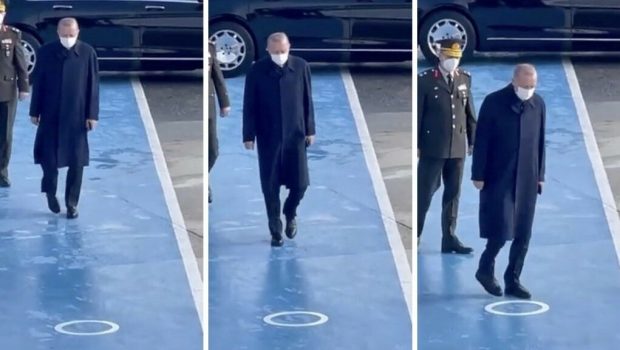
“De-escalation”. The key word for Greek relations – turkey. As the Turkish president himself, Recep Tayyip Erdogan admitted, there are not a few heads of state and willing brokers who contacted Ankara to persuade it to reopen the channels of dialogue with Greece in order to reduce tension.
The state of “no war” that prevails in the eastern Mediterranean, at the forefront of which is the Greek-Turkish, while at the same time Erdogan’s speech insists on threats and warnings, in his own style. “We can come one night.”not only leaves indifferent the big players in the region, among them the United States and France, but also Germany.
Erdogan: We are ready
On Friday, the Turkish president reiterated that Turkey is fully prepared if necessary and is watching developments in Alexandroupoli and “is not afraid.” Even Erdogan announced in Athens that he would not clearly reveal “when and what Turkey will do” toward Greece, while the meeting of the two countries’ national defense ministers, Nikos Panagiotopoulos and Khulusi Akar, preceded the NATO ministerial meeting. Meeting. A meeting in which the two discussed – official statements were announced that avoided the word “agreed” – to keep channels of dialogue open.
Akar did not fail to indirectly but clearly point back to Greece as responsible for the “wireless silence” prevailing recently, expressing hope for a new meeting on CBMs in the coming days.
Despite the fact that Erdogan insistently sticks to inflammatory rhetoric, there is a tendency in the Turkish government environment to “lower the tone” and stop the “madness of statements.”
There are not a few diplomats in Ankara who are aware of the impasse in Greek-Turkish relations and underscore the danger posed by the continued escalation of rhetoric. The same in Athens, hence the message about the “removal of drama”.
The attack on Greece is popular
Press sources in Turkey admitted that in the past the controversy over the Greek-Turkish language was practically out of the news, because the public was not interested. However, as diplomats point out, the attack on Greece recently, by both the government and the opposition, “has become commonplace”. Even if polls show that Turkish citizens do not consider Greeks to be enemies.
In this context, those who are calmer assert that even at the level of public speaking it is not easy to constantly threaten, because there will come a time when you have to do something.
Turkish press sources indicate that Ankara may be ready to accept even a solution that does not fully satisfy the claims it is putting on the table. They did not fail to point out that the Turkey-Libya memorandum of 2019 was clearly – they say – a political response to the signing of EastMed and the 3+1 alliance (Greece – Cyprus – Israel + USA).
With some emphasizing at this stage the need to take steps to prevent such developments, which would allow the army to enter the spheres of diplomacy.
The Kalin-Sullivan meeting seems to have played its part in the de-escalation messages, but if the Turkish president does not decide on it himself, how easy is it to enforce this view?
honest compromise
In this context, Turkish sources, who take for granted that Ankara can proceed with an “honest settlement”, wonder whether Greece is on the same line and to what extent Athens can reach a compromise.
They also highlight the timing of the tripartite elections in Greece-Turkey and Cyprus in 2023, noting that this is a recipe for a “perfect storm.”
In Athens, once again, diplomats demonstrated Erdogan’s recent statements. They note how easily he transitions from suggesting dialogue to threats, depending on his audience.
With the stalemate remaining, what is even more worrying is that the international media is now referring to a “conflict” between Turkey and Greece, no one can say – though – that it will be pursued, nor can they rule out a possible incident.
Certainly, the mood and clear proposals after the Israeli-Lebanese agreement that contribute to bringing about radical changes in the map of alliances and energy planning in the Mediterranean and the Middle East for a settlement, or even a breakthrough in Greek-Turkish terms, have become clearer. . in Athens and Ankara.
But the question is – especially in the run-up to elections – who is finally afraid of dialogue and who can really talk about compromises that would defuse the tension and show a third way of solutions?

“Hipster-friendly coffee fanatic. Subtly charming bacon advocate. Friend of animals everywhere.”





More Stories
F-16 crashes in Ukraine – pilot dies due to his own error
Namibia plans to kill more than 700 wild animals to feed starving population
Endurance test for EU-Turkey relations and Ankara with Greece and Cyprus